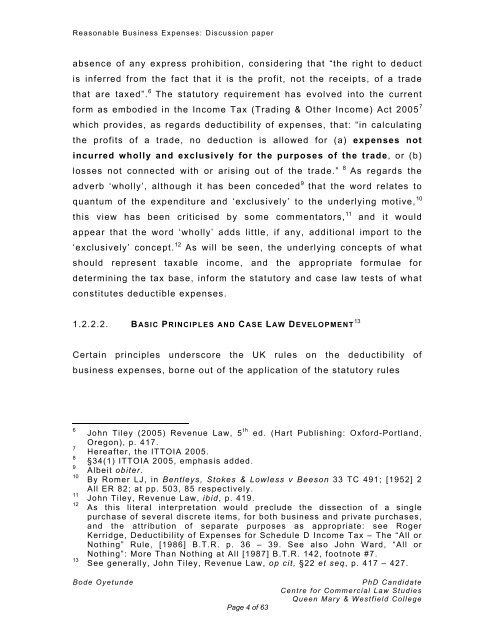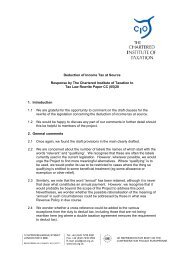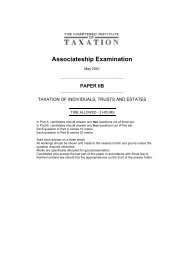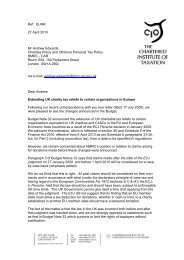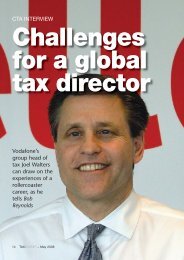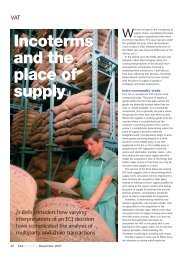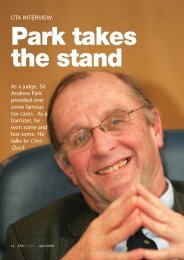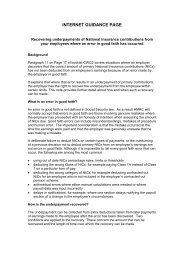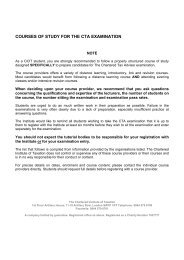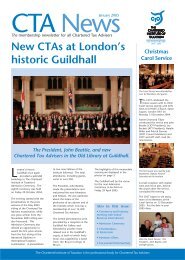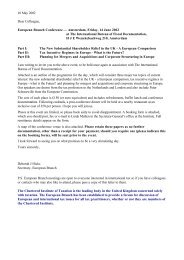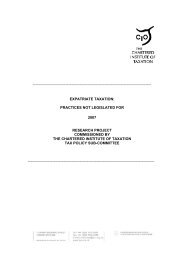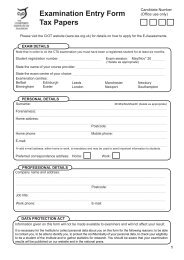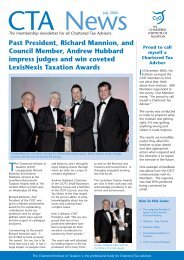Reasonable Business Expense - The Chartered Institute of Taxation
Reasonable Business Expense - The Chartered Institute of Taxation
Reasonable Business Expense - The Chartered Institute of Taxation
You also want an ePaper? Increase the reach of your titles
YUMPU automatically turns print PDFs into web optimized ePapers that Google loves.
<strong>Reasonable</strong> <strong>Business</strong> <strong>Expense</strong>s: Discussion paperabsence <strong>of</strong> any express prohibition, considering that “the right to deductis inferred from the fact that it is the pr<strong>of</strong>it, not the receipts, <strong>of</strong> a tradethat are taxed”. 6 <strong>The</strong> statutory requirement has evolved into the currentform as embodied in the Income Tax (Trading & Other Income) Act 2005 7which provides, as regards deductibility <strong>of</strong> expenses, that: “in calculatingthe pr<strong>of</strong>its <strong>of</strong> a trade, no deduction is allowed for (a) expenses notincurred wholly and exclusively for the purposes <strong>of</strong> the trade, or (b)losses not connected with or arising out <strong>of</strong> the trade.” 8 As regards theadverb ‘wholly’, although it has been conceded 9 that the word relates toquantum <strong>of</strong> the expenditure and ‘exclusively’ to the underlying motive, 10this view has been criticised by some commentators, 11 and it wouldappear that the word ‘wholly’ adds little, if any, additional import to the‘exclusively’ concept. 12 As will be seen, the underlying concepts <strong>of</strong> whatshould represent taxable income, and the appropriate formulae fordetermining the tax base, inform the statutory and case law tests <strong>of</strong> whatconstitutes deductible expenses.1.2.2.2. B ASIC PRINCIPLES AND CASE LAW DEVELOPMENT 13Certain principles underscore the UK rules on the deductibility <strong>of</strong>business expenses, borne out <strong>of</strong> the application <strong>of</strong> the statutory rules678910111213John Tiley (2005) Revenue Law, 5 th ed. (Hart Publishing: Oxford-Portland,Oregon), p. 417.Hereafter, the ITTOIA 2005.§34(1) ITTOIA 2005, emphasis added.Albeit obiter.By Romer LJ, in Bentleys, Stokes & Lowless v Beeson 33 TC 491; [1952] 2All ER 82; at pp. 503, 85 respectively.John Tiley, Revenue Law, ibid, p. 419.As this literal interpretation would preclude the dissection <strong>of</strong> a singlepurchase <strong>of</strong> several discrete items, for both business and private purchases,and the attribution <strong>of</strong> separate purposes as appropriate: see RogerKerridge, Deductibility <strong>of</strong> <strong>Expense</strong>s for Schedule D Income Tax – <strong>The</strong> “All orNothing” Rule, [1986] B.T.R. p. 36 – 39. See also John Ward, “All orNothing”: More Than Nothing at All [1987] B.T.R. 142, footnote #7.See generally, John Tiley, Revenue Law, op cit, §22 et seq, p. 417 – 427.Bode OyetundePage 4 <strong>of</strong> 63PhD CandidateCentre for Commercial Law StudiesQueen Mary & Westfield College


